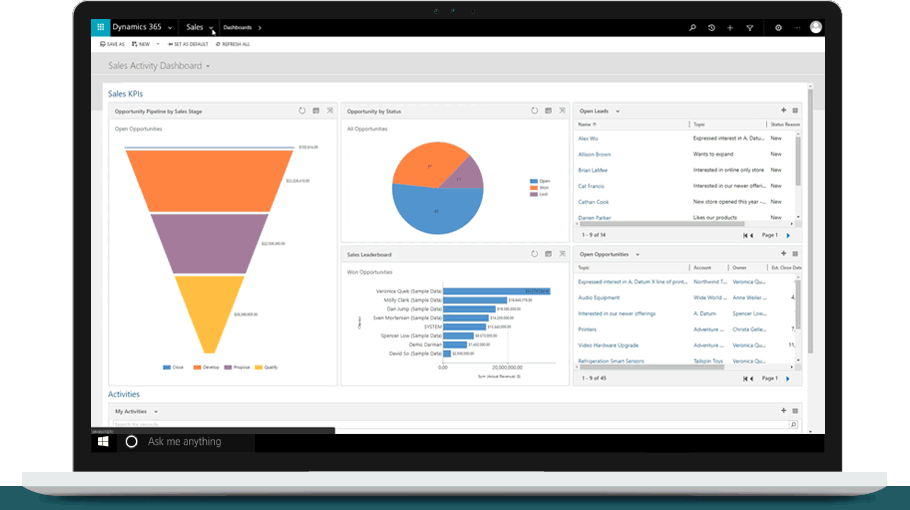
How to align marketing and sales with Microsoft Dynamics 365
Content
Digital apps for marketing activities? There are a lot of them. Controlling all sales processes with software? Nothing fundamentally new. Yet even with these tools marketing and sales are often not aligned, with both teams working separately and occasionally even pursing different goals.
Problems of disconnected marketing and sales teams
- Lack of transparency
By using separate solutions for marketing and sales, teams cannot maintain a complete overview of all activities. If one department does not know what the other one is working on, tasks are often handled with different focuses.
- Difficult lead scoring
It is hard for sales teams to evaluate leads if they have little or no insight into marketing activities and thus only incomplete insight into acquisition and previous interactions.
- Inconsistent goals
For sales and marketing teams with separate processes target definitions often differ. This significantly complicates the cooperation between marketing and sales.
- Inefficient resource allocation
With the digital age, the buying process has fundamentally changed. What used to work for sales teams alone is now only effective in cooperation with marketing. An inconsistent sales and marketing strategy leads to inefficient allocation of resources.
The results of these problems are inconsistent lead qualification processes, lost leads during handover, and less revenue. Separate processes for sales and marketing can also cost sales opportunities and efficiency.
Aligning marketing and sales processes
Aligning marketing and sales is therefore essential. It can lead to 36 percent higher customer retention rates and 38 percent higher sales win rates. The first step in bringing sales and marketing activities closer together is to simplify cooperating.
This can be achieved when sales and marketing can access the same information. Sales uses information the marketing team passes on to customers, and marketing uses the sales team’s interactions with customers to generate high-quality content that is designed to capture prospects’ attention. After all, digital transformation does not mean providing each department with different digital tools but to digitally align processes across the business.
Video: Configuring and managing Dynamics 365 Sales and Dynamics 365 Marketing
Uniting marketing and sales in Dynamics 365
Microsoft Dynamics 365’s business applications do exactly that. Dynamics 365 Marketing and Dynamics 365 Sales are based on the same platform (the Common Data Service) and can therefore be easily combined with each other. Aligning marketing and sales is thus simplified.
Accessing the same database allows both teams to share data and business processes. For example, qualified leads from marketing can be transferred directly to the sales team and sales can be supported in prioritizing opportunities with lead evaluation models.
When marketing and sales work together in Dynamics 365 without data silos, it becomes easier to track results from both areas and implement changes effectively. Leads are thus integrated into all activities. Lead generation is increased and existing leads are actively promoted.
Customer journeys and interactions
If communication processes are not properly coordinated and thus maybe even redundant, this is frustrating for both prospects and customers. Aligning marketing and sales in Dynamics 365 provides a common understanding. With a tailored customer approach, it becomes clear how the customer journeys differ depending on the industry and person. These in-depth insights can then be used to deliver relevant and tailored content. For example, if a potential customer visits a certain web page and shortly afterwards receives information or offers pertaining to this page, the e-mail opening rate will be higher compared to a classic newsletter providing only general information.
Pre-defined processes, e.g. for contacting new customers, can be used to automatically send out e-mail templates. A unified solution allows you to filter contacts based on any attribute or behavior. With this detailed demographic knowledge of contacts, sales and marketing teams in Dynamics 365 have a holistic view of who their potential customers are and what they are interested in.
How many processes exist in marketing and sales teams that are always the same? Processes that could easily be standardized? With automated workflows, prospects can pass through the marketing and sales funnel much more efficiently. Thanks to individually configurable dashboards and Power BI insights in the Dynamics 365 apps, campaign performance and marketing activities can be tracked transparently.
Spotlight: Microsoft Dynamics 365 Sales
Dynamics 365 Sales is an innovative sales management solution that helps categorize and evaluate leads using AI and machine learning. It is suitable for use in different companies and industries and can be customized to fit unique requirements.
The most important benefits of Dynamics 365 Sales at a glance:
- Building trusting relationships with AI-supported consulting
- Increased productivity through sales automation
- Increased revenue by analyzing relationships and insights into business transactions
- Decision-making based on real-time data and new trends
- Social intelligence to track consumer mood

Glimpse into the Dynamics 365 Sales environment
Spotlight: Microsoft Dynamics 365 Marketing
Digital tools help to boost marketing activities and to deepen customer relationships. Dynamics 365 Marketing is leading by example. The application covers the entire process from mailings to event management and online marketing.
Dynamics 365 Marketing is ideal for these purposes:
- Planning the flow of customer contacts based on purchasing behaviour and preferences
- Running multi-channel marketing campaigns
- Using configurable templates, reusable content blocks and design tools
- Accompanying leads along the customer journey
- Creating attractive landing pages

Glimpse into the Dynamics 365 Marketing environment
However, it is not only marketing and sales that can be aligned with Dynamics 365. Extend your Dynamics organization with compatible third-party solutions or additional Dynamics 365 apps for more functionality. Our experts will be happy to advise you in a personal call.
FAQ:
Dynamics 365 Marketing is a module of Microsoft’s Dynamics 365 business suite that supports users with marketing activities of all kinds. The solution helps you orchestrate personalized customer journeys, generate, nurture and work with leads, as well as plan and execute campaigns and events. It can be integrated seamlessly with other Dynamics 365 modules, for example, Dynamics 365 Sales, to ensure smooth collaboration.
Dynamics 365 Marketing includes multiple features to engage with leads and customers. Among them are:
- Customizable email templates
- Customer contact tracking
- Tools to create automated email campaigns
- Tools to create multi-level, multi-channel customer journeys
- Customizable web page features to create websites or online forms
- Event management feature
- LinkedIn lead gen forms
- Lead scoring
Both Dynamics 365 and Salesforce are Customer Relationship Management (CRM) solutions.
Which one is better suited for your company depends on your requirements, needs and expectations. When you are already using Microsoft products in your company, we recommend you Dynamics 365 to be sure you can integrate your existing Microsoft systems smoothly with your new CRM.













